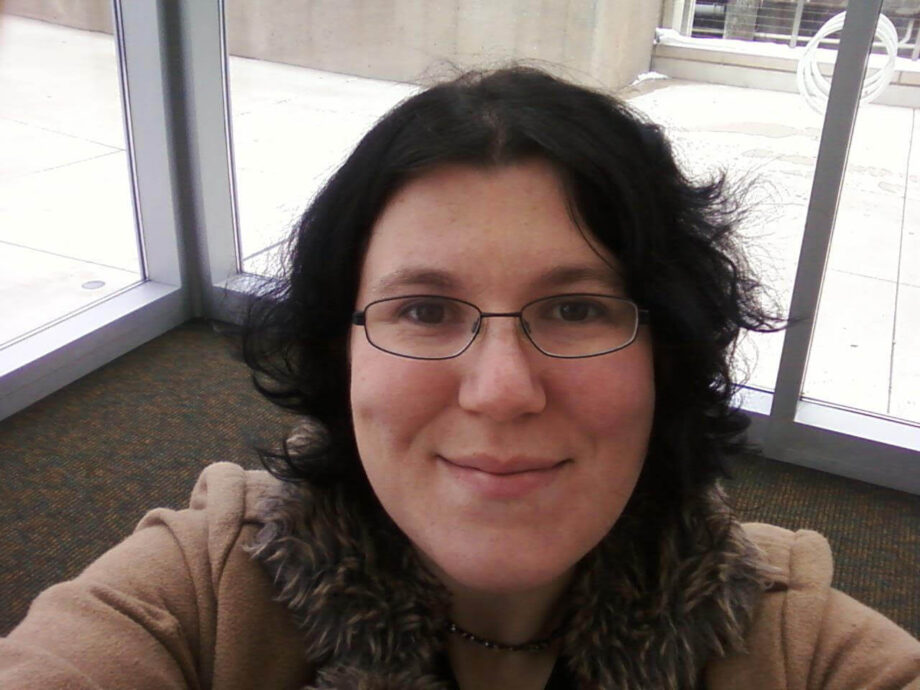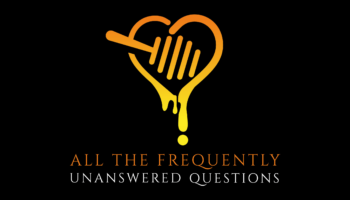Another month means another featured sex blogger and this month we're proud to announce that it's Page Turner from Poly.land. If you haven't checked out this blog yet, well, you should. Do it now. We'll wait. If you're like us, you'll probably stay a while, because Page's writing about polyamory, relationships and all the moving parts of a full polyamorous life is fresh, relateable, touching, funny and true. Whether you're deep in the poly lifestyle or just curious to read about it, we guarantee you'll connect with something on this site. Go check it out!
Now, here are Page's answers to Kinkly's 10 questions.
Kinkly: Give us three words that describe your blog.
Page: Wholesome, ambiamorous, polymathic.
Kinkly: What inspired you to start the blog?
Page: When I first started exploring polyamory, kink and the sex-positive community, I read everything I could get my hands on. And I discovered quickly that while the how-to articles and books were nice, I really enjoyed reading bloggers most of all. They weren’t concerned with being perceived as authorities. Or coming off as perfect. They just wrote what happened – the good, the bad and the ugly.
Blogs gave me a good snapshot of how actual people behaved when they were in polyamorous relationships or kink dynamics, which frequently involved dealing with situations that not only had you never personally dealt with yourself, but also things you’d never seen anyone else going through. Say, by watching your parents and other adults growing up or even on TV.
So when I found a blogger whose voice I liked, it was a huge deal for me. I’d follow them closely, reading every word they wrote. There was only one problem: Their updates were few and far between. Often weeks, if not months, would pass between entries. But I did my best with what I could find.
Meanwhile, I started writing about my own experiences privately. I’ve always been someone that processes through writing. At first I just wrote for myself and then after a while I started sharing my writing with friends, in a locked-down journal where I talked a lot about polyamory and kink. A few of the friends who read it started to encourage me that I should be blogging more publicly. I argued with them for a while, but eventually I caved.
And when I did, I didn’t want readers to have huge gaps where I didn’t write. I decided that I would post every day no matter what (and since September 2016, I’ve kept that promise, posting something new every day).
Essentially, I set out to be the blogger I could have used when I was new to polyamory and kink.
Kinkly: What’s behind the name?
Page: I didn’t grow up considering myself sex-positive or even a feminist. Sure, I’ve always been bisexual (Kinsey 5, too, with a strong preference for women, sometimes identifying as lesbian) but for most of my life I felt deep shame about my sexual orientation. And I lived in a conservative area.
Interestingly, polyamory was my foray into a ton of self-liberation when it came to sex. I wasn’t enthusiastic about polyamory when I first heard of the idea, after a close friend came out to me as polyamorous. But over time as I talked to my friend, I ended up warming a bit on the idea and even eventually tried it myself, opening up my own relationship.
And I was shocked to find that when I actually gave it a chance, polyamory ended up being a really good fit for me.
Once I was out of my comfort zone, it wasn’t too much of a leap to start looking into other things: feminism, sex positivity, BDSM.
Everything changed - I even changed my career! I’d been told my whole life that since I was an artist that naturally that meant I couldn’t be a scientist. In light of all the other recent shakeups, I realized that might not be true. I took a leap and went back to school and became a psychological researcher.
Essentially, questioning monogamy led to questioning everything else.
As part of that sea change, I moved cross-country to a more sex-positive social group. Suddenly, something like 90% of my friends were kinksters, three-quarters were polyamorous, and two-thirds were some variety of bisexual.
So I like to joke that I had a quarter-life crisis and ran off to Poly Land which, depending on the day and who is around, is either a sex circus or the EPCOT Center of Love.
Kinkly: Who’s your target reader?
Page: Anyone who wants to get a peek behind the scenes of what it’s like to explore polyamory or kink or is looking for ways to improve their relationship skills – whether that’s as part of a monogamous relationship, a polyamorous relationship system, or something else.
I think the blog is a really good fit for anyone who likes to ask questions about sex and relationships and geek out about people.
Kinkly: What’s unique about your blog?
Page: There are two things, really. As others have put it, I’m a “wholesome slut.” Not wholesome as in church-y wholesome (the blog is most certainly not PG-rated), but wholesome as in feel-good or positive.
One reader called me “the Brene Brown of Fetlife” and it kind of made my day. OK, my week, really. Brown is an esteemed vulnerability researcher – and a total Care Bear. Truth be told, I’m basically Tenderheart myself.
There’s this deeply ingrained idea in our culture that people who are sex-positive – and especially people who have multiple partners at the same time – are immoral, selfish people with no self-control. Women especially have the additional stereotype that they’re stupid on top of it. You know, a dumb floozy.
Without even really being aware of it, I’d absorbed a lot of this messaging when I was growing up. When I first became polyamorous, I worried that as a sensitive person I wouldn’t fit in.
But once I did begin to meet more poly people, I found that the sex positive folks in polyamorous and kink circles (some of them proudly self-identifying as sluts) were completely different than the stereotypes had led me to believe. By and large, they weren’t people who had problems with commitment. Many of them were actually multicommitted, holding themselves accountable not just to one person but to multiple other people. They were empathetic and caring. Basically total softies.
And on top of that, the group of folks I found myself in were highly intelligent. A mix of academics and professionals.These weren’t dumb floozies.
So part of my mission in writing about my own life and the lives of people close to me has been making sure that I accurately reflect that. I leave in the dorky references. If I want to write about Mister Rogers, I write about Mister Rogers.
Sometimes the blog is sexy, sometimes it’s about feels I’m having, and sometimes it’s full of ridiculous pop culture references.
The other thing that’s sort of unusual is that even though it’s called Poly Land, I’m more ambiamorous than polyamorous. When I started the blog, most of the big voices in polyamory were folks who said they’d always been polyamorous, that they’d always known and that it had been natural and easy for them.
Not me. Nope. I didn’t have an inkling that polyamory was something I should be doing. I thought monogamy was the only game in town. And as I’ve dated people and learned more about myself, my natural mono/poly orientation seems to be somewhere in between polyamorous and monogamous – I’m able to happily have relationships in either style. It all depends on the people involved and the situation. In essence, I’m ambiamorous.
While this was frustrating to realize, it helps as a blogger as I look at both monogamy and polyamory in often unusual ways.
Readers often tell me that I’m excellent at speaking to other people who are somewhere in between – whether monogamish, polycurious, monoflexible, ambiamorous, or just exploring. And I have a lot of monogamous readers who say that my blog is the only polyamory blog that they enjoy.
About a third of our readership is monogamous, a third is polyamorous, and a third is somewhere in between. I like that.
Kinkly: What is the topic you find yourself covering most often and why?
Page: I probably write the most about how to have difficult conversations and different strategies for handling challenging emotions. As one would expect, jealousy is a frequent topic, but readers also want help with other topics like having accountability talks, grief issues, dealing with rejection, etc.
When you’re dealing with custom relationships, whether in the realm of consensual non-monogamy or in BDSM, you in effect become an architect of your own relationships. This often calls upon relationship skills that we aren’t taught because our culture repeatedly tells us that there’s one standard template for how relationships should be (sometimes known as the relationship escalator.
So a lot of the work I do is helping people develop some of those skills.
Kinkly: What was your most popular post ever? Why do you think it drew so many readers?
Page: As far as specifically sex-related articles, hands down the most popular would be “Why It’s Tempting to Fake Orgasms, But You Really Shouldn’t.” I think it was because I managed to talk about an issue that frustrates a lot of women and was able to attack from a slightly different angle (sexual competence – or lack thereof).
The same could be said of our most popular piece of all time overall, “The Switcheroo.” That post attacks the notion that polyamory is something women are forced into and benefits men in a lopsided way. In reality, most polyamorous women are feminists, and most polyamorous communities I’ve visited are actually very female dominated. As I say in that piece, polyamory is a matriarchy.
That post has been really controversial. Interestingly, I’ve been criticized by people from all walks of life for it. Men’s rights activists took issue with the ending AND social justice folks were offended by the beginning.
Fascinating stuff, really.
Kinkly: What’s the best thing about writing a sex blog?
Page: Teaching people things is awesome! I love it when I get comments or messages from people telling me that I’ve been their introduction to X or Y concept.
I’ve also particularly enjoyed representing non-monosexuality (i.e., people who are not strictly straight or gay - so bisexuality, pansexuality, etc).
Kinkly: What’s the worst thing about it?
Page: Days when I have writer’s block. Ugh. They’re the worst.
Kinkly: OK, now for the good stuff: Give us your best tip for great sex.
Get comfortable with sex. Become comfortable talking about sex. And get so comfortable with talking about sex that you can effectively help another person become comfortable talking to you about sex – so you can learn what they like (and what they don’t).
Now, you can’t *control* another person’s comfort level, but you can *influence* it by modeling that comfort yourself.
What great sex involves will depend on the person you’re having sex with, what they like, what they don’t. Most of the skills/techniques themselves are fairly easy to pick up. It’s more a matter of getting so you can communicate your preferences to one another – or figure it out together if one or both of you doesn’t know due to inexperience (or bad experience).




